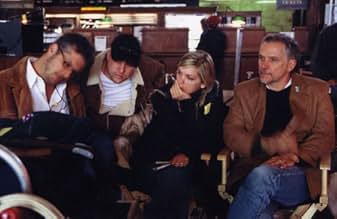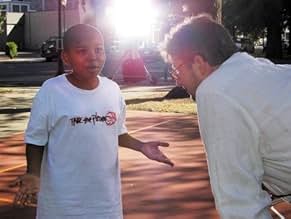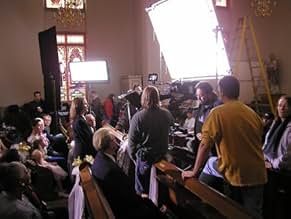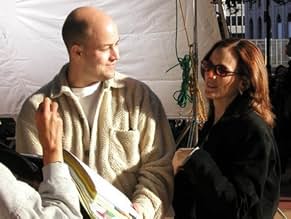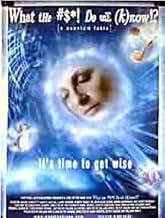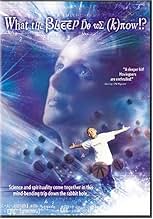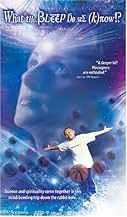Que sait-on vraiment de la réalité!?
Titre original : What the #$*! Do We (K)now!?
- 2004
- Tous publics
- 1h 49min
NOTE IMDb
5,2/10
14 k
MA NOTE
Ajouter une intrigue dans votre langueA fictional photographer's quest to spiritually rediscover herself is interspersed with documentary footage of scientists and theologians discussing the philosophical aspects of quantum phys... Tout lireA fictional photographer's quest to spiritually rediscover herself is interspersed with documentary footage of scientists and theologians discussing the philosophical aspects of quantum physics.A fictional photographer's quest to spiritually rediscover herself is interspersed with documentary footage of scientists and theologians discussing the philosophical aspects of quantum physics.
- Réalisation
- Scénario
- Casting principal
- Récompenses
- 2 victoires au total
James Langston Drake
- Groom
- (as Jame Drake)
Michele Mariana
- Tour Guide
- (as Michelle Mariana)
Avis à la une
About 20 years ago, I encountered quantum mechanics in The Dancing Wu Li Masters by Gary Zukav, and the Tao of Physics by Fritjof Capra. Despite the *relative* popularity (note the emphasis on "relative") of such books, the average person in the street has never read a science book that wasn't assigned to them in high school or college. And those books certainly weren't speculating on the nature of Life, the Universe and Everything based on the implications of quantum physics!
In my own life, awareness of the intersection of science of spirituality has given me a smidgen of additional fuel in my life of studying Christian and Eastern mysticism. So imagine my delight when I learned "What the Bleep" promised an exciting investigation into the cutting edge of science and spirituality. Surely there would interviews with people like Rupert Sheldrake, Freeman Dyson, and Larry Dossey!
Well, no, although most of the scientists were well-qualified to speak on the quantum concepts addressed. Strangely, the film undercut itself intellectually by not giving the names and qualifications of the speakers underneath their "talking heads" but only at the end. Regarding spiritual speculations, I find Capra, Sheldrake, and Dossey have more depth when it comes to this sort of thought, but the opinions shared may be eye-opening for many viewers who have never considered the inter-connectedness of mind, the universe, and God.
"What the bleep" has a beautiful visual style, exciting graphic effects, and also gets out of typical documentary mode by creating a small story of a deaf woman photographer's frustrations with life. The "Polish Wedding" sequence is hilarious, and might actually have you rolling in the aisles, as it did me!
The disappointment comes, oddly enough from the "Spiritual Teachers, Mystics, and Scholars" used. Sounds impressive right? There were only two. One was "Miceal" Ledwith, (elsewhere spelled Micheal), former member of the Catholic International Theological Commission, (who retired from Maynooth College in Ireland about the same time he made a private settlement regarding sexual abuse of a minor--see the Irish Times article of June 1 2002). The other was--get ready--RAMTHA! Yes, Ramtha, the absurd "Neolithic entity" supposedly channeled by JZ Knight.
Both Ledwith and Ramtha seemed to only be used to bash conventional religion with "the shackles of restrictive doctrine," and in Ramtha's case, assure us all that we are God. Yippee! No need to worry about meditation, service, or denying the ego. Why, I wondered, would someone go to the trouble of sharing the scientific plausibility of mysticism only to undercut it with the bitter statements of a former Catholic priest and the laughingstock of New-Age kookiness?
Perhaps it's because, according to Wikipedia.org, all three filmmakers are students of the Ramtha School of Enlightenment. Ultimately this was a long, entertaining commercial. Ramtha will see you now. Keep your ego, but bring your checkbook.
In my own life, awareness of the intersection of science of spirituality has given me a smidgen of additional fuel in my life of studying Christian and Eastern mysticism. So imagine my delight when I learned "What the Bleep" promised an exciting investigation into the cutting edge of science and spirituality. Surely there would interviews with people like Rupert Sheldrake, Freeman Dyson, and Larry Dossey!
Well, no, although most of the scientists were well-qualified to speak on the quantum concepts addressed. Strangely, the film undercut itself intellectually by not giving the names and qualifications of the speakers underneath their "talking heads" but only at the end. Regarding spiritual speculations, I find Capra, Sheldrake, and Dossey have more depth when it comes to this sort of thought, but the opinions shared may be eye-opening for many viewers who have never considered the inter-connectedness of mind, the universe, and God.
"What the bleep" has a beautiful visual style, exciting graphic effects, and also gets out of typical documentary mode by creating a small story of a deaf woman photographer's frustrations with life. The "Polish Wedding" sequence is hilarious, and might actually have you rolling in the aisles, as it did me!
The disappointment comes, oddly enough from the "Spiritual Teachers, Mystics, and Scholars" used. Sounds impressive right? There were only two. One was "Miceal" Ledwith, (elsewhere spelled Micheal), former member of the Catholic International Theological Commission, (who retired from Maynooth College in Ireland about the same time he made a private settlement regarding sexual abuse of a minor--see the Irish Times article of June 1 2002). The other was--get ready--RAMTHA! Yes, Ramtha, the absurd "Neolithic entity" supposedly channeled by JZ Knight.
Both Ledwith and Ramtha seemed to only be used to bash conventional religion with "the shackles of restrictive doctrine," and in Ramtha's case, assure us all that we are God. Yippee! No need to worry about meditation, service, or denying the ego. Why, I wondered, would someone go to the trouble of sharing the scientific plausibility of mysticism only to undercut it with the bitter statements of a former Catholic priest and the laughingstock of New-Age kookiness?
Perhaps it's because, according to Wikipedia.org, all three filmmakers are students of the Ramtha School of Enlightenment. Ultimately this was a long, entertaining commercial. Ramtha will see you now. Keep your ego, but bring your checkbook.
The movie got a lot of the quantum theory and neurology right, but then it proceeds to make a lot of wild tangential claims that are loosely based on the theory and pass it off as the absolute truth. Anybody with a advanced physics background (my job requires an advanced math and physics background) will be deeply turned off (despite the fact that a number of physicists and neurologists are interviewed for the film). The scientists back up the scientific theory, but then some new age woman and others (some scientists, but mainly that woman) kept on saying things that were loosely based off of the theory. The movie basically passed that off as scientificly valid as quantum theory, but provides no serious argument as to why. I was really bothered by the fact that the movie was already drawing conclusions for me instead of posing questions as to different possibilities.
The movie may be interesting to some, and I don't discurage anybody from watching it, but please watch it with a grain of salt.
The movie may be interesting to some, and I don't discurage anybody from watching it, but please watch it with a grain of salt.
It's nice to see that there are some movies being made and released into mainstream theaters that actually make you think. Great fictional films do this through the delivery of their stories, but What the #$*! Do We Know does it in a much more direct way, almost like an educational film. It's a fascinating exploration of existential theories and philosophy, and is one of those very rare movies that will challenge the way you think even about everyday life. It's a strange film and moves entirely too fast for much of it's material to sink in, but it's a great exploration of quantum physics and some of the implications that it has on our lives that we really don't think about, but should.
The story sporadically focuses on the life of Amanda (Marlee Matlin), a deaf woman suffering through heartbreak and work troubles but who ultimately alters her perception by applying certain rules and theories of quantum physics, as I imagine we are expected to after seeing the movie. The great thing about the movie is that it makes you think, but the biggest problem with it is that it uses presentation to make simple statements seem grand and make crazy assertions seem like they have merit.
There is one point where the movie says, "Here's a puzzle - why should we be able to remember the past and not have the same access to the future?'' What is that? A completely obvious fact of linear time is rendered strange just by being in this movie. It's odd that the movie delves so deep into such statuesque disciplines as quantum physics and the very fabric of the universe, while not knowing why you can remember a conversation you had today, but for some weird, unknown and mysterious reason, you can't remember a conversation you will have tomorrow.
The film also makes outlandish claims and then shrouds them in the mysteriousness of unobservable history. There is a part of the movie that claims that when the first ships arrived in what is now North America, the Native Americans looked out to sea and saw the water parted by the ships, but could not see the ships themselves because they had never seen anything like them before. This, obviously, is utter nonsense, but the movie uses it as an example of its suggestion that there are different levels of reality for different people. There is no pure, objective reality, but different plains of existence for different people.
A friend of mine, who hails this as one of the greatest films he's ever seen, explained to me that the Native Americans' minds simply did not understand how to decode the concept of a ship, a signifier which they had never encountered and so it was perfectly understandable that they couldn't see it. Wrong! Sure, they had never seen ships before, but I am willing to go out on a limb and assume that they had seen wood before, and since vision is merely the process of light bouncing off of objects and coming into contact with the retina inside the eye, it is physically impossible for a Native American to have x-ray vision because he or she doesn't know what a certain object is.
My friend used the example that it is not until you learn that lightning travels from the ground to the clouds rather than the other way around that you really begin to see it that way. Before you learn that curious little fact, you see lightning and are completely sure that it's coming out of the clouds and zapping the earth. You do see it differently from then on, it's true, but you did SEE it before you knew where it originated, right? And incidentally, lightning is known to travel from the ground to the clouds, from the clouds to the ground, and from one cloud to another. But when it occurs, I am willing to suggest that it's rarely invisible, even if, as they say, there's no one there to see it.
I believe that the human mind is set up to believe what it wants to believe (hence religion), but I do not feel obliged to believe that people's beliefs or knowledge enable them to see through solid objects just because they've never seen them before, nor do I believe that any human has the ability to change the molecular structure of water just by thinking about it in a certain way, which is another of the more bizarre claims that the movie makes. I don't know, I just never thought of water as susceptible to being offended or made happy, or having any effect over human emotions.
But while the movie does slip up by going a little far in claims like these, it's important to have things like this because even for things like invisible ships, which we know are not reality, it is good that it makes you think about them. There are a lot of things in the world that we take for granted, and not just possessions but truths, and it is movies like What the #$*! Do We Know that really get people thinking about them. For a while, at least.
The story sporadically focuses on the life of Amanda (Marlee Matlin), a deaf woman suffering through heartbreak and work troubles but who ultimately alters her perception by applying certain rules and theories of quantum physics, as I imagine we are expected to after seeing the movie. The great thing about the movie is that it makes you think, but the biggest problem with it is that it uses presentation to make simple statements seem grand and make crazy assertions seem like they have merit.
There is one point where the movie says, "Here's a puzzle - why should we be able to remember the past and not have the same access to the future?'' What is that? A completely obvious fact of linear time is rendered strange just by being in this movie. It's odd that the movie delves so deep into such statuesque disciplines as quantum physics and the very fabric of the universe, while not knowing why you can remember a conversation you had today, but for some weird, unknown and mysterious reason, you can't remember a conversation you will have tomorrow.
The film also makes outlandish claims and then shrouds them in the mysteriousness of unobservable history. There is a part of the movie that claims that when the first ships arrived in what is now North America, the Native Americans looked out to sea and saw the water parted by the ships, but could not see the ships themselves because they had never seen anything like them before. This, obviously, is utter nonsense, but the movie uses it as an example of its suggestion that there are different levels of reality for different people. There is no pure, objective reality, but different plains of existence for different people.
A friend of mine, who hails this as one of the greatest films he's ever seen, explained to me that the Native Americans' minds simply did not understand how to decode the concept of a ship, a signifier which they had never encountered and so it was perfectly understandable that they couldn't see it. Wrong! Sure, they had never seen ships before, but I am willing to go out on a limb and assume that they had seen wood before, and since vision is merely the process of light bouncing off of objects and coming into contact with the retina inside the eye, it is physically impossible for a Native American to have x-ray vision because he or she doesn't know what a certain object is.
My friend used the example that it is not until you learn that lightning travels from the ground to the clouds rather than the other way around that you really begin to see it that way. Before you learn that curious little fact, you see lightning and are completely sure that it's coming out of the clouds and zapping the earth. You do see it differently from then on, it's true, but you did SEE it before you knew where it originated, right? And incidentally, lightning is known to travel from the ground to the clouds, from the clouds to the ground, and from one cloud to another. But when it occurs, I am willing to suggest that it's rarely invisible, even if, as they say, there's no one there to see it.
I believe that the human mind is set up to believe what it wants to believe (hence religion), but I do not feel obliged to believe that people's beliefs or knowledge enable them to see through solid objects just because they've never seen them before, nor do I believe that any human has the ability to change the molecular structure of water just by thinking about it in a certain way, which is another of the more bizarre claims that the movie makes. I don't know, I just never thought of water as susceptible to being offended or made happy, or having any effect over human emotions.
But while the movie does slip up by going a little far in claims like these, it's important to have things like this because even for things like invisible ships, which we know are not reality, it is good that it makes you think about them. There are a lot of things in the world that we take for granted, and not just possessions but truths, and it is movies like What the #$*! Do We Know that really get people thinking about them. For a while, at least.
Okay, cult ties or not, this was an interesting film. It offers up a variety of ideas and leaves it to the viewer to decide whether or not to believe. Visually, it was a beautiful film with great art direction and special effects. Marlee Matlin was effective in the main role, although I thought the "story" detracted from the documentary portion of the film.
As to the film's ties to cults--I didn't see anything coercive or subversive in the film. After viewing it, I'm not ready to sell my soul to some guru. OTOH, I do find myself thinking more about the thoughts I have, and the effect they have on my spirit and body. Moral of the story--take out what you will, and don't join a cult. Duh.
As to the film's ties to cults--I didn't see anything coercive or subversive in the film. After viewing it, I'm not ready to sell my soul to some guru. OTOH, I do find myself thinking more about the thoughts I have, and the effect they have on my spirit and body. Moral of the story--take out what you will, and don't join a cult. Duh.
I wanted to like this film and was prepared for a treat. The visuals and the unusual way of presenting the material was initially stimulating and creative. What made it even easier for me to get involved was that the social ideology advanced closely matches my own. But the expressed connection between particle physics and social prescription was, in my view, either wishful thinking or intellectually dishonest. You can't use the harsh rigors of science to establish credibility and then let your logic go all warm and fuzzy coming to the conclusion you wanted all along -- especially if the conclusion is quite defensible on other bases. As a scientist, I was irritated. As a social liberal, I was embarrassed.
Le saviez-vous
- AnecdotesJohn Gorenfeld wrote in a September 2004 Salon article that David Albert, one of the interviewed experts in the film, feels he was duped and misrepresented as to the real purpose and agenda of the movie. "Albert, a professor at the Columbia University physics department, has accused the filmmakers of warping his ideas to fit a spiritual agenda. 'I don't think it's quite right to say I was "tricked" into appearing,' he said in a statement reposted by a critic on What the Bleep's Internet forum, 'but it is certainly the case that I was edited in such a way as to completely suppress my actual views about the matters the movie discusses. I am, indeed, profoundly unsympathetic to attempts at linking quantum mechanics with consciousness. Moreover, I explained all that, at great length, on camera, to the producers of the film ... Had I known that I would have been so radically misrepresented in the movie, I would certainly not have agreed to be filmed. I certainly do not subscribe to the 'Ramtha School on Enlightenment," whatever that is!' he finished. Albert provided Salon with an excerpt from a piece he's writing on the subject, in which he says, in part, 'I'm unwittingly made to sound as if (maybe) I endorse its thesis.' When told of Albert's complaints, [Meyer Gottlieb, president of the movie's distributor, Samuel Goldwyn Films] said, 'I certainly don't see it,' but acknowledged he's 'not into the science 100 percent.'"
- GaffesDepiction of quantum mechanics in the movie bears no resemblance to the real theory of that name. In particular, the common misconception that the "observer effect" is dependent upon a sapient, human observer is incorrect. If any object interacts with any other, and either requires information regarding the current state and properties of the other, then that constitutes an observation.
- Crédits fousThe Scientists, Mystics and Scholars interviews herein were chosen based on the expertise in the subjects which they discussed. They do not necessarily agree with all viewpoints put forth in the film. Likewise the Filmmakers may not agree with all the viewpoints put forth by the Interviewees. Agreement is not necessary - thinking for one's self is.
- ConnexionsFeatured in Brows Held High: Mr. Nobody and Living in Bad Faith (2015)
Meilleurs choix
Connectez-vous pour évaluer et suivre la liste de favoris afin de recevoir des recommandations personnalisées
- How long is What the #$*! Do We (K)now!??Alimenté par Alexa
Détails
- Date de sortie
- Pays d’origine
- Langues
- Aussi connu sous le nom de
- What the #$*! Do We (K)now!?
- Lieux de tournage
- Sociétés de production
- Voir plus de crédits d'entreprise sur IMDbPro
Box-office
- Montant brut aux États-Unis et au Canada
- 10 942 306 $US
- Week-end de sortie aux États-Unis et au Canada
- 7 655 $US
- 8 févr. 2004
- Montant brut mondial
- 21 054 050 $US
- Durée
- 1h 49min(109 min)
- Couleur
- Mixage
- Rapport de forme
- 1.85 : 1
Contribuer à cette page
Suggérer une modification ou ajouter du contenu manquant







